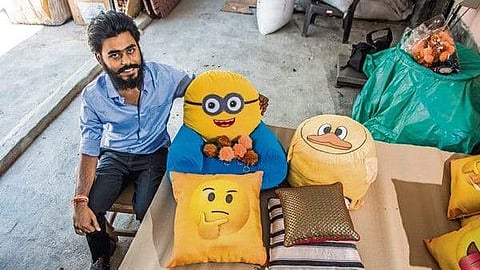

It is estimated that globally, about 4.5 trillion cigarette butts are littered in a year. In India, there is no proper method or process to responsibly discard cigarette butts — most of the time, people throw them on the road and forget. A start-up based in Noida (which in no way is promoting smoking) however, has a solution to ensure cigarette butts are put to good use. Started in 2016 and renamed with extended operations in 2018, Code Effort Pvt Ltd, the brainchild of Naman Gupta, processes everything that is left after a cigarette has been smoked to create usable products such as soft toys, cushions and even mosquito repellent.
How it all began
Naman, a Delhi University graduate, noticed this monumental problem relating to the disposal of cigarette butts while in college. "We noticed cigarette butts lying on the roads nearby, our friends in college also had the habit of throwing them on the road or disposing them off in the regular bins. These would then end up in landfills as there was no adequate or segregated disposal of cigarette butts. We wanted to do something. We had numerous questions on our mind — what happens to the stubs after disposal in regular bins, how much pollution do they cause and more. I then looked for answers on the internet and did some research only to find that the filters are made of a polymer, cellulose acetate, which is almost like plastic and thus, quite harmful to the environment. After further thorough research on the topic, we found a way to treat these butts with a unique chemical composition in order to turn them into a usable material that can be used to create everyday products," Naman tells us.
The start-up has several strategies to collect the waste, one of which includes setting up Value Bins outside the shops of street vendors, paanwalas, in several corporate spaces that collect the cigarette waste and then send it to Code's manufacturing unit. "Cigarette waste is a common problem. When we collect waste, in turn, we ensure the vendors a rate of `250 for a kilo of cigarette butts. We operate across 250 districts in India," adds Naman.
So, what's the process exactly?
Naman begins, "We have developed a unique chemical composition after several rounds of testing that can treat these cigarette butts up to 99 per cent. These butts have fibre material in them that take at least 10-12 years to decompose naturally, thus it becomes a huge environmental issue not just in India but worldwide. We don't have proper disposal systems in India, so it ends up in the landfills and can become a concern in the near future. We provide an end-to-end solution."
Explaining how the cigarette butts are treated, he adds, "When the waste is delivered to our factories, we separate them manually — paper and the polymer filter inside — and process them separately. The filter goes through a process of shredding. It's a 24-36 hours treatment process, no machinery is involved, chemicals are bio-degradable and human-friendly. Then it goes through a normal washing and drying process. After a quality check, it is put into a carding machine that makes the material soft and usable. These are then turned into soft toys, cushions, keychains and mattresses. The paper that we retrieve from the butts is developed into a pulp — we add normal water and an organic binder so it becomes stronger. This pulp is then sent to our expert workers who produce it in paper format. Then it's dried in the sun. Once dried, we can give a specific shape and sell it in the market as a mosquito repellant." Code has recycled approximately 250 million cigarette butts so far.
Speaking about the benefit of this process, Naman adds, "Butts are efficiently managed and recycled, thus their adverse effects on the environment are reduced. Our suppliers and volunteers get monetary benefit as well as employment opportunity in our recycling unit. We have approximately 50 female employees who help with the separation, paper-making process, they can also do this at their own houses, which makes it easier for them to earn a livelihood for themselves." As for their future plans, Naman wants to expand internationally and help conserve the environment.
